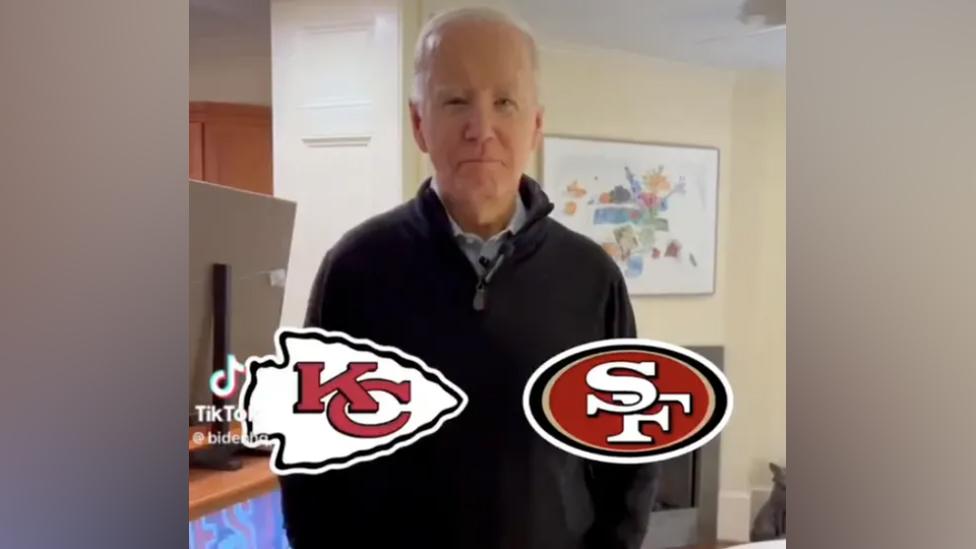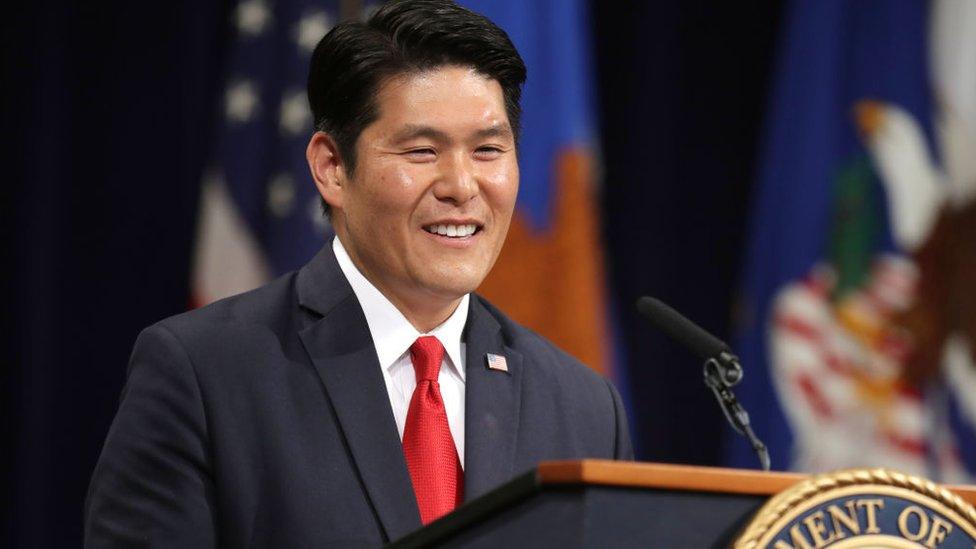'Lol hey guys' - Biden joins TikTok despite security concerns
- Published

President Joe Biden's campaign has joined TikTok, despite the app being banned on most US government devices over security concerns.
His campaign launched its account with the username "@bidenhq" during the Super Bowl on Sunday.
In a launch video, captioned "lol hey guys", aides quizzed Mr Biden about his preferences for the big game.
The president signed legislation in 2022 blocking most federal government devices from using TikTok.
Several states have also adopted the measure. Lawmakers from both sides of the aisle have called for the app - owned by Chinese company ByteDance - to be banned in the US over concerns the government in Beijing might be able to access user data.
Still, the site remains popular with young people in the US, a demographic that the White House is keen to energise for this November's election.
Mr Biden's TikTok account will not be run by the president himself, but by his campaign team, aides told US media.
Asked in the launch video if he was rooting for the Kansas City Chiefs or the San Francisco 49ers, Mr Biden said the Philadelphia Eagles, because otherwise "I'd be sleeping alone" as "my wife's a Philly girl".
He was also asked about a Taylor Swift Super Bowl conspiracy theory that saw some claim the singer's relationship with Kansas City Chiefs star Travis Kelce was part of a plot to rig the NFL's championship game and help get Mr Biden re-elected this November.
"I'd get in trouble if I told you" about the conspiracy, Mr Biden joked.
Michael Starr Hopkins, a Democratic strategist who worked on Barack Obama and Hillary Clinton's campaigns, said that many Democrats have been hesitant to use TikTok to connect with voters given the data security concerns.
But he said that candidates have to face the fact that it is a platform where they can reach people of all demographics.
"You've got to meet voters where they are. If they're using it, they're using it, and we can't afford to be at a disadvantage if Republicans are utilising it," he said.
Mr Biden's 2024 campaign is hoping to rekindle the record high turnout from young people that helped lift him to victory in the last election.
Around 50% of that bloc voted in 2020, according to Tufts University's Center for Information & Research on Civic Learning and Engagement. And some 65% of voters between the ages of 18 to 24 cast ballots for the Democratic president.
But opinion polling indicates that electoral coalition could be fraying.
Some surveys suggest younger voters, who are more likely to see Mr Biden as too pro-Israel, have become disaffected with his handling of the war in Gaza. Others feel he has not done enough on student loan forgiveness.
Most alarmingly for Democratic strategists, some surveys have even found Mr Biden trailing his rival, former President Donald Trump, 77, among younger voters.
The Biden campaign appears well aware of this issue.
Kyle Tharp, author of political newsletter FWIW - which tracks digital trends, spending and strategy in US elections - said the Biden campaign has leveraged celebrities, influencers and big internet names to get their political messaging out to younger demographics.
While young voters tend to vote for Democrats, their support "will make or break this election this time around", he added.
Connecting with that demographic is key for Mr Biden. The 81-year-old president's age has also been a major concern for voters of all ages, and opinion polls suggest up to 75% of those expected to cast their ballots in November believe he is too old for the job.
The White House suffered political embarrassment last week when a justice department inquiry into his handling of classified documents called him a "well-meaning, elderly man with a poor memory".
Special counsel Robert Hur did not recommend charges for Mr Biden.

More on the US election
Explained: A simple guide to the US 2024 election
Analysis: Where Biden v Trump will be won and lost
Policies: What a Trump second term would look like
On the ground: Are black voters losing faith in Biden?
Related topics
- Published11 February 2024

- Attribution
- Published6 February 2024

- Attribution
- Published12 February 2024

- Published10 February 2024
